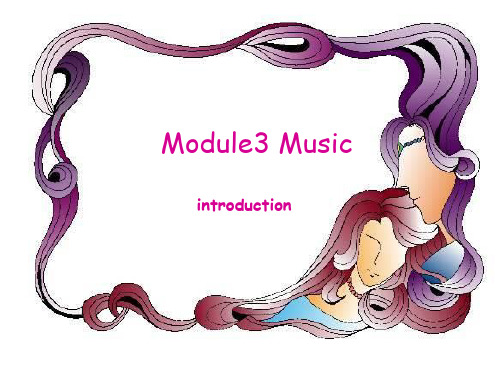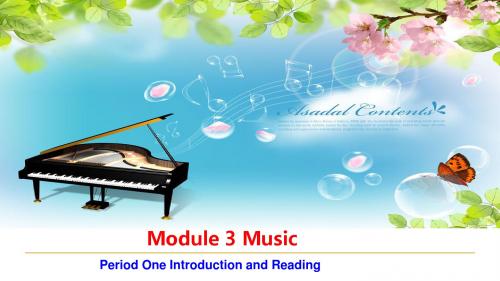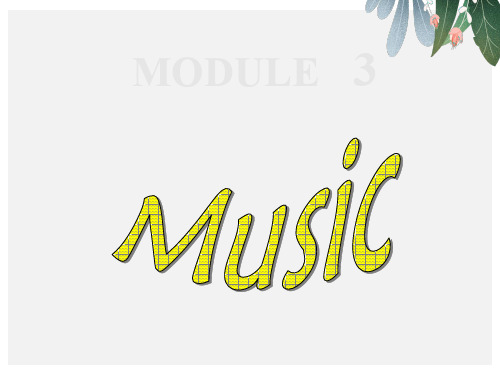(完整版)外研版高中必修二模块三IntroductionandReading
- 格式:ppt
- 大小:10.38 MB
- 文档页数:40


Introduction & Reading and VocabularyⅠ. 单词拼写1. He travels quite a distance (距离) to work every day.2. When the cleaner found the abandoned (被遗弃的)baby, it was dying.3. Yuan Longping is a famous rice expert(专家).4. By the time he arrived, it was well past midnight (半夜).5. He works in marketing and product(产品) development.6. The train passes through some amazing scenery(风景).7. If caught, the men could be shot (射杀).8. We broke our journey (旅程)to have a picnic.9. Trained (训练) workers will repair such a car.10. He drove off into the desert(沙漠).Ⅱ. 从方框中选词组并用其适当形式填空get off, get into, get out of, be short for, get on, not. . . any more, refer to, take off1. A ticket inspector got on the train and began to check our tickets.2. When the bus stopped to refuel, some passengers got off to breathe in the fresh air.3. Two ladies in fashionable clothes got out of the taxi and walked into the shopping centre.4. Thin air makes it more difficult for planes to take off and land safely.5. CEO is short for Chief Executive Officer.【补偿训练】MVP is short for the most valued player in a game.6. My mobile phone did not work any more so I had to have it repaired.7. One day a woman got into her car and started driving home after work.8. Green is not always referring to the color; in some cases, it is the term used for environmental friendly.【补偿训练】Finish the exercise without referring to the dictionary.Ⅲ. 根据提示完成句子1. What a busy day!多么繁忙的一天!(what)2. What do you think we should do to improve our environment?为改善环境你认为我们该做些什么? (think)3. Almost every university now has a website which allows us to look through the information about it.现在几乎每个大学都有一个网站, 让我们浏览关于它的信息。




Module 3 musicAims and requirements●To enable the students to listen and talk about likes and dislikes (especially about music and musicians),encouraging them to try the vocabulary and everyday English in this unit●To develop the students ’ reading ability●To help the students learn and use two grammars (adverbial clause of time and the past perfect tense) in different situations●To help the students to write a biography of a person, using the time expressions in Grammar 1Teaching proceduresPeriod 1 Introduction ,Warming up Teaching aims:Enabling the students to1. know some words about music2. know something about three great posersstep1. Warming up by listening pieces of music and asking questions Play several pieces of music (music from Haydn, Mozart and Beethoven will be best) to let the students listen and appreciate, then ask them:1) Do you like music?2) What about these pieces?3) What is your favorite kind of music?4) Who is your favorite musician? And who is your favorite poser? step2. Warming up by showing some pictures and discussing1) Do you know who they are?2) What kind of things are these pictures connected with, science, culture,politics, painting, drawing or music?step3. Warming up by listening to a piece of musicGood morning, class. Today we are going to read a passage about three great musicians who are all posers. A poser is a musician who writes pieces of beautiful music for others to sing or to play. Now,let’s listen to a piece of music.(the teacher plays a piece of music ----er quan yingyue)1.do you know what kind of music it is?2.whose work is it?3.what kind of music is it?4.what is your feeling after listening to it?Step 4 show the following picturesAnd make the students familiar with these new words:Piano violin saxphone drum erhu guitarste p4.now please match these musical instruments with their names.Step 5 work in groups to discuss these questions:1.which of the instruments do you like listening to?2.which famous musicians play them?3.is the chinese instruments different from the otherinstruments?describe the difference,if there is one.Step6 summary and homework:Today we’ve learnt the Introduction,know something about music,and we’ve also learnt some new words.The homework:1.Try to instruct your favorite musician to your class orally.2.Learn the new words again, using the dictionary if necessaryPeriods 2 Reading and VocabularyTeaching Aims:Train the students' reading ability.Learn some useful words and expressions.Teaching Important Points.Help the students to understand the passage better.Learn and master some important words and phrases in this period. Teaching Difficult Points:How to help the students improve their reading and understand the passage better.Teaching Methods:Fast reading to get the general idea of the text.Careful reading to understand the passage better.Discussion to help the students understand what they've learned better. Teaching procedure.Step 1 Lead --inThe teacher may play a kind of music written by Beethoven.------- What kind of music do you think it?----- Who do you know wrote it ?The teacher may discuss the questions and answer them freely.T: As we know, there are various kinds of music around the world. They all have their own obvious characteristic. And also there were famous posers such as Joseph Haydn, Mozart, and Beethoven. Today we may learnof their life from the text.Step 2 Reading prehension.Fast reading: Read the passage quickly and choose the best title.A.Three Great Austrian posers.B.Three Great poser of the eighteenth Century.C.Three Great Child posers.Key: B.Now let's read the passage again, underline new words in the text and decide whether the following statements are right or not.1.The three posers were all born in Austria.2.Mozart had a beautiful singing voice.3.Mozart died before his fortieth birthday.4.Beethoven once worked at the court of a prince, who began to go deaf when he grew older.5.Beethoven had ever met Haydn, but he didn't think he taught him a lot.6.Both Haydn and Mozart had fathers who were musicians.Key:1.F Beethoven was born in Bonn, Germany.2.F. Haydn had a good singing voice.3.T4.F. Haydn once worked at the court of a prince, but he didn't go deaf.5.T6.F. Haydn was the son of a peasant( The teacher may begin with the T/F questions orally and this is a good time to test their listening abilities as well as their prehension of the text. )Step 3 Read and listen to the passage. Meanwhile, some more questions are waiting for you.1.How did Haydn change the form of symphonies?2.How long did he work in eastern Austria?3.How many pieces of music did Mozart pose?4.How old was he when he played for the Empress of Austria?5.How long were Mozart and Haydn friends?6.Who taught Beethoven how to play the piano?7.Did he stop posing when he became deaf?Keys:1 He changed the symphony into a long piece for a large orchestra.2. 30 years.3.More than 600 pieces of music.4. When he was 6 , he played the harpsichord in a concert for the Empress of Austria.Periods 3, Function and GrammarTeaching aims:1 To learn grammar rules2 To use the grammar rules for correctmunication3 To study co-operatelyTeaching important points: To use the correct tense and theproper conj.Teaching difficult points:To use correctly the two tenses andthe three conj.Teaching methods: Explanation and practiceTeaching procedure:Step Ⅰ Lead-in by telling the class what happened to the Shenzhou Ⅻand technology is developing rapidly, China hasachieved a lot in the area of.Shenzhou Ⅻscientists,engineers and the whole nation were waiting andI couldn’t help getting exciteed. I feel proud of our country. Step Ⅱ Grammar 11 Make sentences with “when , while, e in , have a lesson” ( Here is a picture of a classroom and a student ing in)A When he came in, we were having a lesson.B When we were having a lesson, he came in.C While we were having a lesson, he came in.2 Say the meaning of “as” in the following sentences.D As he was a child, he studied drawing.E As he grew older, he began to go deaf.F He listened to music as he walked.当…之时随着一边…一边…3Answer the three questions.When we talk about a single event in the past,we use when asin A .When we talk about a period of time in the past,we use when/ while/ as as in B C D.We use as to refer to a progressive change as in E F .4Practiceplete the following sentences with “when ,while , as”(1) ___she was studying at school, she also sang in the schoolchoir.(2) ___he was living in Vienna, he studied music.(3) ___she met bach,she was only 20 years old.(4) ___he grew older, he found it more difficult to pose music(5) ___he was playing in the orchestra, he met his wife.(6) ___he was working in Hollywood, he became ill and died.(7) ___I listened to the violin solo, I fell in love withclassical music.(8) ___they toured Europe for 10 years, they finnally decidedto live in Austrilia.Step Ⅲ Grammar 2 The past perfect tense1Read the following sentences and summarise rules, paying attention to tenses. Fill in the blanks.After Liping had finished doing his homework, he turned on the TV. After they had got everything ready, they began to do the experiment. Before he came to our school, he had taught English for several years. Before his letter reached me, I had received his telephone call.They had finished the project by last month.I had left the country by the time the letter reached me.had done before diddid after had donehad done by did/past time2 PracticeWorkbook Grammar (2)(3)(4)plete the sentences using the verbs in brackets and the past simple or past perfect tense.StepⅣ1 Game Oral practice ,pair work.Ask and answer questions using all kinds of tenses.Example:-- When did you have your breakfast this morning?-- At 6.-- Have you prepared for the English lesson?-- Yes, I have. I have finished the exercises in the workbook.2 Watch a vedio play.Step Ⅴ Sum upAsk some students to make sentences using “when, while, as, before, after, by”.Step Ⅵ Homework: Present a biography of a famous Chinese musician orposer.Periods 4 Speaking and Writing Teaching Aims:1.Knowledge and Skilla.To develop speaking ability by talking about likes and dislikes.b.To learn about some vocabulary and knowledge related to music andposers.c.To develop writing ability by presenting a biography of a famousChinese musician or poser.d.Train the ability of collecting and dealing with information, anddevelop their abilities of getting new information, munication and cooperation.2.Emotion and Valuesa.To raise students’ interests in science and form the right attitudetowards all kinds of music.b.To help them know Chinese traditional music well and cultivate theirinterest in playing some Chinese instrument.3. Character-building:a.To make them know how to enjoy different kinds of music.b.Arouse their interest of playing some kinds of instrument and enrichtheir leisure time.4. Cross-cultural awarenessa.To help them know the difference between China and some westerncountries in instruments.b.Cultivate their awareness of cultural munication through the speciallanguage—music.Difficulties and Importance:a.To make the students understand and grasp the vocabulary andknowledge related to music.b.To enable the students to know how to use adverbial clause of time. Teaching Method:a.Task-based methodologyb.municative ApproachTeaching Procedures:Step 1 Pre-readingLook at the picture and answer the following questions.1.Who is he?2.Have you ever know something about him?Step 2 While-readinga. SkimmingRead the passage quickly, and make a note of some basic information about Ye xiaogang.Suggested answers:b. Detailed readingRead the passage carefully and fill in the blanks with proper words. Find what Ye Xiaogang did or what happened to him in the following years:Suggested answers:Step 3. Post-readingDiscussion.1.Are there any similarities between Ye Xiaogang and the European posersyou have read about in this module?2.Do you think it is a good idea to mix Chinese and western music? Step 4 Everyday Englisha. Listen to two people talking about the way they listen to music and answer the questions.1.How do they listen to it?2.Are they happy with the way they listen to music?3.What does Anna offer to do for Tom?b. work in pairs. Discuss your favourite music and how you listen to it.Step 4 Guided writingWrite a short passage of a famous singer in China—Han Hong.The following words may help you:1. sing well successful song writer2.born in1971 in Tibet(西藏)3. young watch her mother sing and dance4. at the age of nine professional(专业的) training in Beijing.5. in 1985 her first national prize6. write songs in 19937. song Hometown number one in ChinaHomework:1.Finish writing the biography of Han Hong—a famous Chinese singer.2.Finish other exercises in this module.Periods 5 culture cornerTeaching aims:Enabling the students to1. to know sth about Ye Xiaogang2. write a biography of a famous Chinese musician or poser.Teaching steps:I. Ask some students to say something about Mozart.Give as many details as possible.II. Try to think of a Chinese musician or poser, eg. Xu Peidong.Gather these materials.1. when, where and in what kind of family he/ she was born.2. how he/ she spent his/ her childhood or youth.3. about his/ her education4. what are his/ her famous works5. what his/ her style is / wasGroup work. Ask the students to discuss about the musician or poser.Then ask some students to stand up to say sth. about the musician or poser.Correct the mistakes if any.III. Cultural Corner.Ye Xiaogang1. Listen to the passage and try to find the answer to this question:When did his album Horizon appear? (in 1986)2. Read the passage thoroughly and make a note of the information about Ye Xiaogang.Name:_________________ Sex: __________________Nationality:_____________ Job:___________________Main achievements: ____________________________________________Style of music: ____________________________What he did or happened to him in the following years:1955: ___________________________________________From 1978 to 1983: ___________________________________________1985: ___________________________________________1986: ___________________________________________1996: ___________________________________________3. Check the answers with the whole class. Then ask one or two students to say sth about Ye Xiaogang with the help of the notes made.4. Language points:1) work as2) leading modern posers 主要作曲家leading article 社论the leading cause 主要原因a leading role 主角3) mix A with B= mix A and B togethermix win with waterNever mix with such people.mix up 弄混,弄错It’s mon to mix him up with his brother.弄乱mix up the papersmix up those data4) receive many prizes5) part ofIV. Homework:Write a short passage about the Chinese musician or poser we talked about this period.。
5. Electric energy can be changed ________ light energy as ________ as sound energy.3.with/by4.for5.into语篇提能I think we are harder on ourselves than anyone else is. Maybe I will leave my room. And maybe, I'll play the piano again.1.The underlined part“the disaster”in Paragraph 3 refers to ________.A.the loud cheers of the audienceB.the laughs from the audienceC.the author's piano performanceD.the author's practice on the stage2.We can infer from the text that ________.A.music played a big role in the author's lifeB.the author enjoyed staying with her familyC.piano practice made the author feel confidentD.the author got support from her family3.What did the author learn from her piano performance?A.Don't be too hard on oneself.B.Things seldom go as well as people expect.C.No one will care what others have done.D.Never think much of a matter.4.What would be the best title for the text?A.A Piano LessonB.My Family and IC.My Aunt DianneD.A Piano Recital Disaster答案:1.解析:词义猜测题。